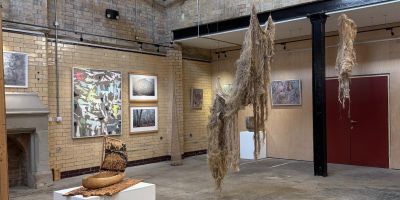Art as Advocacy: A Model of Inclusive Curatorship
Art as Advocacy: A Model of Inclusive Curatorship
As part of Milton Keynes Disability Awareness Day, Jade French will be talking through research undertaken for her PhD, Art as Advocacy, at an event at the MK Gallery on 13 July.
Over the past twenty years within the UK, the concept of self-advocacy has gained momentum by enabling people with learning disabilities to speak out in order to affect change, with inclusive research emerging as result.
In the same period inclusive arts practice has developed, reflecting a growing recognition of people with learning disabilities as artists, performers and communicators ― yet curation has only rarely been used as an inclusive practice and then principally in museums dealing with history rather than arts contexts.
Since 2014, Jade French has been carrying out research under the heading of Art as Advocacy in order to address this gap. Jade is a practice-led PhD student based in the School of Fine Art, History of Art and Cultural Studies at the University of Leeds.
Her study has explored the potential for participatory curatorial practice by people with learning disabilities to act a site for self-advocacy. It has considered how and in what ways curatorship can be effective political act for this group, examining the potential links between self-expression and political collectivism.
As the study was practice-led, it brought together learning disabled members of self-advocacy group Halton Speak Out with members of Bluecoat’s inclusive arts projects Blue Room to curate an exhibition. These curators developed an exhibition theme, collaborated with artists, commissioned new artwork via an Arts Council England Grant, directed the install and designed accessible interpretation for audiences. The result was Auto Agents, a visual arts exhibition over 2016/7 at Bluecoat which then went on to be displayed at the Brindley’s gallery in Halton in the spring of 2017.
Auto Agents (image courtesy of Jade French)Ultimately it is intended that this research will contribute to a greater understanding of curatorial practice as a political act, broader expressions of ‘speaking out’ by people with learning disabilities and of accessible models of curatorship.
At the MK Gallery’s Thursday Scratch Night on 13 July, Jade will be talking through a case study of this project, illuminating the approaches and sharing findings. Jade said:
“I am delighted to be invited to discuss Auto Agents and my PhD at Milton Keynes Disability Awareness Day. The event is doing a fantastic job in raising awareness in how the arts can be a way to explore and share experiences of disability.”




